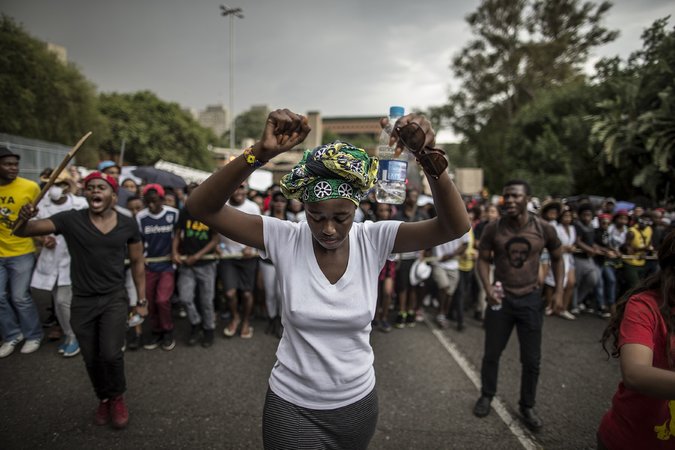Monday Briefing | October 26

Students marching at the University of the Witwatersrand in Johannesburg last week. Picture by Marco Longari | Agence France-Presse — Getty Images

Stories to Follow
South Africa student protest.
Last week, tens of thousands students of in South Africa managed to lock down major universities across the country. They were protesting a projected tuition increase that would keep poor people out of school. The protests were met with violence from the police, a conflict that, FT reporter said, was “not seen since the apartheid era.” On Friday, President Jacob Zuma said there wouldn’t be any increases in tuition—at least for now. This is not a new, or unique phenomenon of South Africa, for the past years we’ve seen student protests all over the globe. But, as this NYT op-ed argues, in a country where the apartheid legacy is still so present, “extending access to higher education is not some socialist dream; it’s a vital part of stabilizing the country.”
Guatemala’s next president is a comedian.
After some turbulent months without a government in place, Guatemalans have voted in TV comic Jimmy Morales. Guatemala is one of the most corrupt countries in the world, and yet, with the help of a UN-backed panel, they managed to indict a living president. After a corruption scandal, and following some peaceful demonstrations, ex-president Guatemala, Otto Pérez Molina, resigned and was soon afterwards jailed with corruption charges at the end of the summer.
Upcoming Events
The Refugee and Migration Crisis: European and Global Perspectives.
Wednesday, October 28. 5pm-6.30pm. 19 University Place, room 222.
Join Hans Brattskar, Former Norwegian State Secretary for Foreign Affairs and Special Envoy for Climate Change, and Chaloka Beyani, Special Rapporteur on the Human Rights of Internally Displaced Persons, on a discussion about the migration and refugee situation in Europe. RSVP here.
After Ukraine: Scenarios for US-Russia Relations in the post-Soviet space.
Tuesday, October 27. 4pm-6pm. 19 University Place, 2nd floor.
Over the course of more than twenty years the post-Soviet space remained an area of uncompromised rivalry between Russia and the West. The crisis in Ukraine has transformed the rivalry from the competition into the confrontation. Join this colloquium with Maxim A. Suchkov from the Institute for Strategic Studies in Pyatigorsk.
On your Free Time
Last week, the New Yorker started, in conjunction with WNYC, a one-hour show where editors, writers and artists of the magazine will chat about everything and all. For those looking for new podcasts, this it!
Mireia is the Editor-in-Chief at JPI. She’s a Fulbright scholar pursuing an M.A. in International Relations and Journalism at New York University.


